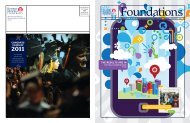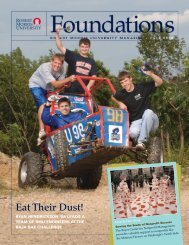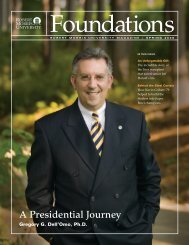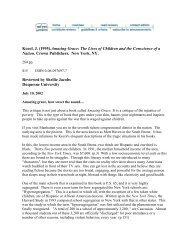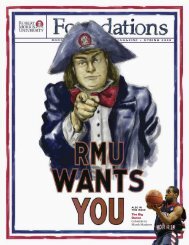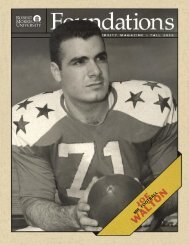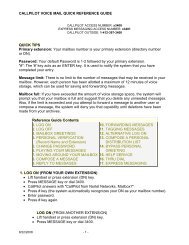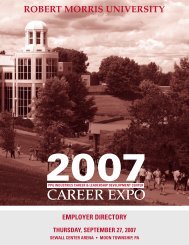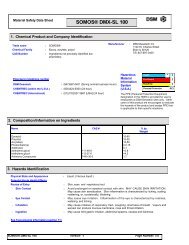Spring 2007 - Robert Morris University
Spring 2007 - Robert Morris University
Spring 2007 - Robert Morris University
- No tags were found...
You also want an ePaper? Increase the reach of your titles
YUMPU automatically turns print PDFs into web optimized ePapers that Google loves.
who leave practice. The nurse practitioner role has been<br />
around since 1965, when the profession was created to help<br />
provide primary care during another time when the country<br />
was expecting a physician shortage. These advanced practice<br />
nurses completed extra education, often a master’s degree,<br />
which provided additional experience in specialty areas<br />
such as family practice, adult health or acute care.<br />
Today, there are more than 140,000 nurse practitioners<br />
working in hospitals and clinics. Since it costs far<br />
less to educate a nurse than a physician, nurse<br />
practitioners can do some of the same work<br />
more efficiently. They create a multiplier effect<br />
for physicians, taking on many common<br />
responsibilities that physicians used to<br />
handle and freeing up doctors to focus<br />
on patients with more complex<br />
problems. Nurse practitioners can<br />
also provide leadership and advocate<br />
for registered nurses, potentially<br />
increasing job satisfaction and reducing<br />
staff turnover, which averages 14 percent<br />
per year.<br />
As demand builds for nurse practitioners,<br />
their need for advanced education and<br />
experience grows. Nurses in general,<br />
and nurse practitioners in particular,<br />
are expected to play a much greater role<br />
in patient care, now and in the future.<br />
When Davidson started her career as a staff<br />
nurse in 1977, the nurse’s role was seen as<br />
subordinate to that of the physician. Nurses<br />
took orders, and they rarely questioned a<br />
doctor’s decision. “As a nurse in the 1970s,<br />
I would look at what was being ordered,<br />
and if there was a red flag or I saw something<br />
that didn’t look right to me, I would call another<br />
doctor that I knew was an expert and say, ‘I’m<br />
worried about this,’” Davidson says. “Then they<br />
would diplomatically contact the physician and<br />
talk about what he or she was doing. It was never<br />
me telling the doctor that this wasn’t a good idea.<br />
We had to play the political game. It was very much<br />
a hierarchical situation.”<br />
This attitude has changed, partly due to patient safety<br />
concerns, partly because of cost pressures, and partly because<br />
nurses are expanding the scope of nursing as a profession.<br />
Studies consistently show that a team approach to providing<br />
care translates to better patient survival and recovery rates,<br />
VALERIE HOWARD, ED.D., RN + DEPARTMENT HEAD OF NURSING<br />
according to Marge DiCuccio, RN, who teaches graduate<br />
classes in RMU’s nursing program and works as clinical<br />
director for critical care services at Children’s Hospital in<br />
Pittsburgh. “Collaboration is really dependent on a high<br />
level of trust,” she says.<br />
The D.N.P. program at RMU will prepare nurses to function<br />
in this demanding, team-based environment and also teach<br />
them skills that used to be the domain of physicians.<br />
The <strong>University</strong> based the new program on a five-part<br />
template for health professions education developed<br />
by the Institute of Medicine: patient-centered care,<br />
interdisciplinary teams, evidence-based practice,<br />
quality improvement and better use of informatics.<br />
The D.N.P. will enhance the expertise of<br />
bachelor’s and master’s prepared nurses,<br />
allowing them to function at the highest<br />
level of nursing practice and assume<br />
greater independence.<br />
Despite the impact this degree will have<br />
on the field of nursing, only about 30<br />
universities now offer a D.N.P., including<br />
RMU. The American Association of Colleges<br />
of Nursing has recommended that all new<br />
advanced practice nurses should be educated<br />
at the doctoral level by 2015. The movement<br />
is so new that the Pennsylvania Department<br />
of Education had to import experts from two<br />
other states to review RMU’s proposal.<br />
RMU’s program offers two options: a B.S.N.<br />
to D.N.P. program for nurses with a bachelor’s<br />
degree, and an “executive format” D.N.P.<br />
completion program for advanced practice<br />
nurses who already hold master’s degrees.<br />
Both programs began admitting students this<br />
spring, and classes will begin in the fall.<br />
The D.N.P. completion program has attracted<br />
interest from as far away as Hawaii because<br />
students will spend only five days per semester<br />
on campus in classes. Students will complete assignments<br />
and clinical experiences in their home locations, relying on<br />
e-mail and the Internet to communicate with instructors.<br />
This part-time program Takes three years to complete.<br />
B.S.N. to D.N.P. students can choose from three different<br />
tracks: adult nurse practitioner (ANP), family nurse<br />
practitioner (FNP) and psychiatric mental health nurse<br />
practitioner (PMHNP). The ANP and FNP tracks prepare<br />
nurses to provide primary care services to a wide range of<br />
14 • WWW.RMU.EDU



